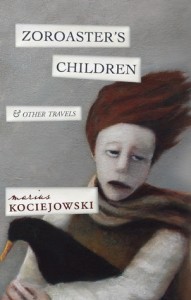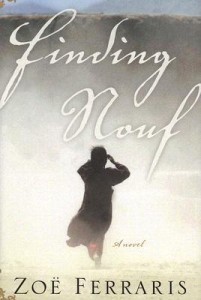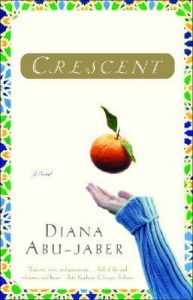New Year, new me, right? Except that reading is the fundamental way I relate to the world, so it’s always books, and in 2026 I’m working on unknotting some of the same obsessions as last year (and the year before, and, let’s be honest, always). Three books opened something for me in the past few weeks that I think will take me deeper and more meaningfully into understanding and living the life I want to live: One Day, Everyone Will Have Always Been Against This by Omar El Akkad, Skeleton Crew by Stephen King, and The Myth of Freedom and the Way of Meditation by Chögyam Trungpa. Let me tell you how this eclectic mix of books is helping me see (and how they might help you, too).
One Day, Everyone Will Have Always Been Against This
 I hadn’t thought about this book at all until I was at a National Book Awards watch party and I saw El Akkad’s gorgeous acceptance speech. My shelves are too full of the non-fiction books I am interested in but that often feel like blocks for me to overcome. But this book was so very worth buying and pushing to the top of the pile.
I hadn’t thought about this book at all until I was at a National Book Awards watch party and I saw El Akkad’s gorgeous acceptance speech. My shelves are too full of the non-fiction books I am interested in but that often feel like blocks for me to overcome. But this book was so very worth buying and pushing to the top of the pile.
“Whose nonexistence is necessary to the self-conception of this place, and how uncontrollable is the rage whenever that nonexistence is violated?” – One Day, Everyone Will Have Always Been Against This
The book is about Gaza, yes, and it is about everything. At the same time it is very simply about the fact that we are not living in the world we say we are living in. The book is beautifully human as he describes his family’s migration (something I always relate to), how colonialism positions the occupied as the aggressor, the delusions of capitalism, and the possibility of walking away.
I’ve been grappling with a lot of things in the past decade that this book helped clarify. From the unbearable pain and beauty that opened up inside me when I was pregnant and could see clearly (for a few years at least) that every single person I encountered was human to the day I looked at my face in the mirror of a house whose mortgage was being paid by the Saudi government to my dawning realization that the Democratic Party is more interested in gaining and retaining power than in helping its constituents (don’t get me started on the GOP).
This book can and should radicalize you.
“Every small act of resistance trains the muscle used to do it… One builds the muscle by walking away from the most minor things—trivial consumables, the cultural work of monsters, the myriad material fruits grown on stolen ground—and realizes in the doing of these things that there is a wide spectrum of negative resistance.” – One Day, Everyone Will Have Always Been Against This
It is the book I most want to press into the hands of anyone I think will read it. It’s a fast read and it’s worth reading over and over and over until you see what it is you can do to change.
“What are you willing to give up to alleviate someone else’s suffering?” – One Day, Everyone Will Have Always Been Against This
“Mrs. Todd’s Shortcut” in Skeleton Crew
 Following a National Book Award-winning book about genocide with a Stephen King book might seem anathema, but Stephen King was an important part of my reading journey when I was a teen seeking to understand the darkness of the world. I don’t read a lot of Stephen King these days, but I’m still proud of how widely I read. More importantly, I found something new (or maybe so old I just forgot) in this book this week when my son asked me to read him what I’ve described as my favorite short story.
Following a National Book Award-winning book about genocide with a Stephen King book might seem anathema, but Stephen King was an important part of my reading journey when I was a teen seeking to understand the darkness of the world. I don’t read a lot of Stephen King these days, but I’m still proud of how widely I read. More importantly, I found something new (or maybe so old I just forgot) in this book this week when my son asked me to read him what I’ve described as my favorite short story.
I first told him about “Mrs. Todd’s Shortcut” because I wanted him to see beyond the bounds of the world as it’s presented. I thought he’d be fascinated by the idea of looking for new and interesting ways to get somewhere in less distance. What I didn’t realize until actually re-reading the story this week for the first time in probably three decades, is how much more I love about this story.
First, King does an excellent job of capturing the speech and cultural patterns of two old men jawing on a porch in rural Maine as they reminisce about the first Mrs. Todd, before she disappeared in her little “go-devil.” There is love in these descriptions for a particular way of life and in how closely he observed them to render them so well.
“Fold the map and see how many miles it is then, Homer.” – Ophelia Todd in “Mrs. Todd’s Shortcut,” Skeleton Crew
Second, I still loved the way this story bends expectations of reality. How it pushes little by little into another view of the world entirely, one where you can get from Castle Lake to Bangor in fewer miles via car than as the crow flies. I’d forgotten about what happens on the dark roads, but the supernatural touches are beautifully gentle enough to put the full energy of the story on possibility.
“There was somethin wild that crep into her face, Dave—something wild and something free” – Homer in “Mrs. Todd’s Shortcut,” Skeleton Crew
Third, I had forgotten the way Homer describes Mrs. Todd. There is awe in the way her former handyman sees her that both appreciates the real wildness of her and isn’t possessive of her. I’m not sure how my teenage self read these words, but as a middle-aged woman, the idea that someone can be so extremely beautiful for being free to be just who she is (and that appreciation not being about the viewer at all) is astounding and welcome.
I haven’t read him “Nona” yet, my other favorite story from the book, and I’m saving my own re-read to discover it with him. Who knows what treasures I’ll find.
The Myth of Freedom and the Way of Meditation
 I’ve been Buddhist-curious ever since my first non-western art history course as an undergrad. The professor showed us a scroll of hungry ghosts and described their constant striving and I knew I’d stumbled on something that explained more than I’d every been able to unravel. For Christmas this year my husband gave me The Myth of Freedom and I’ve been slowly chewing it over. It seems, after reading more about the six realms, that the human realm is more likely my major preoccupation these days than the gaki zōshi, but I’m appreciating this new lens to see the world through.
I’ve been Buddhist-curious ever since my first non-western art history course as an undergrad. The professor showed us a scroll of hungry ghosts and described their constant striving and I knew I’d stumbled on something that explained more than I’d every been able to unravel. For Christmas this year my husband gave me The Myth of Freedom and I’ve been slowly chewing it over. It seems, after reading more about the six realms, that the human realm is more likely my major preoccupation these days than the gaki zōshi, but I’m appreciating this new lens to see the world through.
“If we can accept our imperfections as they are, quite ordinarily, then we can use them as part of the path.” – The Myth of Freedom
Primarily, I’m interested in the idea of sitting with what isn’t working rather than going around. There are a lot of things that aren’t working right now—personally as I try to figure out how to life a life that feels intentional and also feeds my family and globally as we all grapple with what kind of world we want to make. But I’m hoping to see it clearly and move forward into a better way, even if it’s just one step at a time. If there’s something you’re reading that’s bringing you comfort or spurring you to action, please inspire me by sharing it in the comments.
“Just as it has always been possible to look away, it is always possible to stop looking away.” – One Day, Everyone Will Have Always Been Against This
If any of these books piqued your interest, order One Day, Everyone Will Have Always Been Against This, Skeleton Crew, or The Myth of Freedom from Bookshop.org. If you use that link to purchase anything, you’re keeping indie bookstores in business and I receive a commission.
 I’m always excited when I get a package from Canadian publisher Biblioasis. The books they publish (including
I’m always excited when I get a package from Canadian publisher Biblioasis. The books they publish (including 
 I avoided reading Crescent by Diana Abu-Jaber for almost a year. It looked too thick for my purse or the back matter was too fluffy for my mood. When I finally picked up the book, I realized what I’d been missing all this time. And although I lost myself in the story of Sirine and Han so much that I barely annotated the book, it was impossible to ignore how well-crafted this novel is.
I avoided reading Crescent by Diana Abu-Jaber for almost a year. It looked too thick for my purse or the back matter was too fluffy for my mood. When I finally picked up the book, I realized what I’d been missing all this time. And although I lost myself in the story of Sirine and Han so much that I barely annotated the book, it was impossible to ignore how well-crafted this novel is.